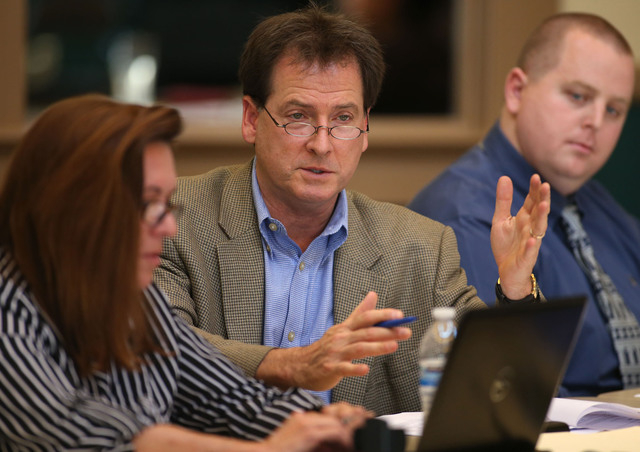Laws give Jane Q. Public government agendas
CARSON CITY — With little fanfare, state legislators recognized during the 2013 session that government is of, by and for the people.
After hearing from constituents that they could not even find out when state and local government agencies hold meetings, legislators passed four laws that should help Nevadans more easily learn what their governments are doing and when they are doing it.
Most importantly, they won’t have to argue to obtain the same information that their elected and appointed officials receive before making decisions.
The new laws require state and local governments to post all agendas on a central website. They also must post online, hand out or email all supporting material for agenda items to residents who request that information, which sometimes are several inches thick.
Both state agencies and local governments as of July 1 were required to place on their agendas the name of someone who can assist people in acquiring the supporting material they want. State agencies also must appoint “records officials” by Oct. 1 whose jobs will be helping citizens secure any public records, past or present. And they can charge no more than 50 cents per page to people who want copies of records.
Too often now citizens walk into a city council or legislative hearing and don’t understand a word. They leave thinking they are stupid and government is too difficult to understand.
But with few exceptions, Nevadans are entitled to the same information that their elected and appointed official are given before they make decisions, lawmakers said.
Armed with all the information, anyone with reasonable intelligence can follow discussions at public meetings before their officials decide how to spend their money.
KEPT IN THE DARK TOO OFTEN
Information made difficult to obtain too often turns into information that remains hidden. Often, the problem erupts in a situation such as this one:
While elected and appointed officials work off an agenda that can include hundreds of items, when Jane Q. Public arrives at the meeting, she might see or be given a short one-page agenda. She notes that one of the items is listed as “settlement with Tawyna Meyer,” an item actually heard in 2012 by the state Board of Examiners.
It sparks her interest, but she doesn’t receive any information about Meyer. Meanwhile, she notices members of the board have a big pile of written material that includes details about every item on the agenda. They talk about the information.
So Jane listens to her officials gripe and eventually decide to make a $125,000 payment to Meyer. She cannot understand why.
If she had been given the same pile of materials as Gov. Brian Sandoval and other board members, she would have learned that Meyer was a Division of Forestry dispatcher who was fired by her supervisors because she became pregnant and would need maternity leave.
Meyer received the payment because of their discrimination. State government is self-insured which means the people of Nevada paid the costs of their discrimination.
State laws already say every citizen can review the same material at the same time as Sandoval, but it’s generally only the news media that finds itself hassling government officials for what is public information.
In this case, a Review-Journal reporter was inquisitive enough to get the story.
DAYS IN THE DARK ARE ENDING
A few other bills also were passed to make sure that the days of government keeping its constituents in the dark are over.
One of the new state laws outlines the procedures government officials must take to get materials to the public. Under Assembly Bill 65, both state agencies and local governments in counties with more than 45,000 people must place on their agendas the name of an employee whose job it is to get them the information they need.
Local governments also must post on their websites, with the agendas, all supporting information for each item.
People such as Jane can request these materials once the agenda is posted, and pick up the packet of information at the government office.
Since the stack of materials might run hundreds of pages, the government can ask her if she will accept it through email. The hope is that Jane will, if only for the sake of saving paper.
This is not the only new law to help the public find out what government is doing.
Under Assembly Bill 445, the Department of Administration by Jan. 1 must establish a website that lists all coming public meetings and the agendas of every state agency, board and commission. Local government must create similar websites by July 1, 2014.
Las Vegas and Clark County already are compiling, and post supporting materials for their agendas.
AGENCIES MAY NOT BE AWARE OF THE LAWS
Some of the changes were proposed by a task force created by Attorney General Catherine Cortez Masto. George Taylor, the deputy attorney general who handles open meeting law matters, expects he will have to remind officials that are unaware of the new laws of their responsibilities. In time, he figures they all will comply.
Assemblywoman Teresa Benitez-Thompson, D-Reno, said the new laws are “not sexy,” but important and useful for Nevada residents who want to follow government decisions. She chairs the Assembly Government Affairs Committee that sponsored three of the laws, each receiving unanimous approval.
Assembly Speaker Marilyn Kirkpatrick, D-North Las Vegas, sought a central place for posting agendas of all government meetings. She testified that few people attend meetings of the state’s local government finance board because they didn’t know of the meetings.
Having one spot to track all coming meetings might get more people to show up, Kirkpatrick said.
Another law, Senate Bill 74, sponsored by Sen. Tick Segerblom, D-Las Vegas, limits the price that government agencies can charge for making copies to 50 cents per page.
And Assembly Bill 31, requires state agencies by Oct. 1 to designate a “records official” whose job will be to handle citizen requests for all present and past public records.
This one is sure to lead to combat.
There are hundreds of laws that stipulate state agencies do not have to release some of their records. If past dealings by reporters are any guide, then the records officials will take it upon themselves to protect their agencies and refuse to release records. That means you may have to take them to court to get the information to which you are entitled. That’s not a cheap option.
SOME AGENCIES ALREADY COMPLY
A check of the Aug. 22 Gaming Control Board agenda shows this agency already has broken the new laws. No employee was listed on the agenda as a contact person to help the public acquire background information.
Give credit to the new state Sesquicentennial Commission. On its Aug. 23 agenda, it listed Scott Carey as its contact for acquiring supporting material. He quickly emailed the information sought by the Review-Journal.
Adriana Fralich, lawyer for the Gaming Control Board, said the name of a contact person will be placed on all future agencies. She said Pete Bernhard, chairman of the Gaming Commission, also wants to post supplemental materials online with future agendas, even though that is not required of state agencies.
Taylor said the changes will be a boon for citizens.
“It will take some time for everybody to catch on, but the underlying purpose is to make it easier for the public,” he said.
Contact Capital Bureau Chief Ed Vogel at evogel@reviewjournal.com or 775-687-3901.






















